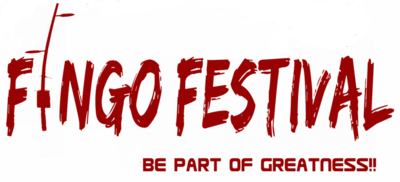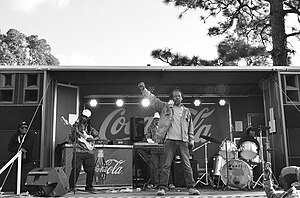Fingo Festival
Using the word "Fingo" derived from the Fengu people, also known as Fingo people, which means "one who seeks a place to stay" in the local language Xhosa, the movement began seeking spaces to build social cohesion and enhance community development.
[3] In 2011, the Fingo Revolutionary Movement partnered with Khulumani Support Group, SOSAC and Makana Local Municipality, which pledged R40 000, to create a platform to keep the local kids away from crime while unearthing their potential through various forms of art and creative projects aimed at building social cohesion.
The Mfengu (Fingos) had moved from a Shaka-dominated KwaZulu-Natal into the Transkei in the 1820s, and in 1835 Sir Benjamin D'Urban settled 17 000 of them on the colonial side of the Cape Frontier before they pledged their assistance to the British war arsenal.
[5] In the 1970s the apartheid government sought to move the inhabitants of Fingo Village to nearby Glenmore under the Group Areas of 1950.
In Fingo Village, 90.09% of the population speaks isiXhosa with English speakers counting for 3.40% and other languages such as Zulu, Afrikaans and Ndebele making up the remaining 7%.
[7] In Grahamstown, home to the National Arts Festival there is great inequality between the city and townships like Fingo Village and Joza.
According to the 2010 statistics, Makana Local Municipality, under which Fingo Village belongs, had a population of some 70,000 people with 27,546 or close to 40% still living in poverty.
Although the theme is a major factor in the structure of the festival, the children's programmes will usually feature face painting, children's plays and storytelling in the mornings while the afternoons will be dedicated to dialogue, followed by a variety of arts, hip hop and live music performances.
[13] These are the themes that have been adopted at the festival over the years: On the year of its inception, the Fingo Festival's aim was to establish a culture of "Vukuzenzele" (Stand up for yourself), be inclusive, build a platform for local artists and social cohesion in the Grahamstown community.
The festival also began to adopt dialogue, using a loose structure that allowed people to voice issues.
To push this theme they adopted the slogan "20fourrrrThina" (2014 for us), which represented how democracy enabled South Africans to play a role in society.
Despite this, the festival managed to attract internationally renowned storyteller, Gcina Mhlophe, to narrate stories for children.

